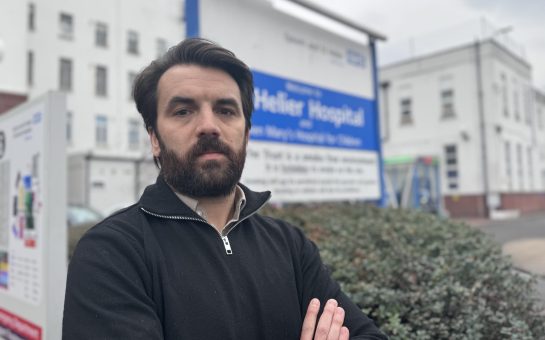A petition to prevent cuts to therapy for adults with eating disorders has so far gained more than 2,500 signatures.
A service review of the adult eating disorder services at Springfield Hospital would see an overhaul of the programme, including slashing psychotherapy for inpatient and day patients.
The petition, which is supported by the UK’s leading eating disorder charity Beat, argues that the changes could remove necessary support for seriously unwell people and that patients were not sufficiently consulted.
The author of the petition, Gabriella Rutzler, 20, said: “I’ve been battling with anorexia for five years and have been in treatment for four years.
“I’m currently at a healthy weight, which brings its challenges, but generally is a much happier place to be at for me.
“I feel extremely lucky to have had access to the resources now being scrapped. More than anything I just feel angry.”
Gabriella was once an inpatient in the Avalon service at Springfield Hospital, where therapy will be reduced from 1.1 to 0.2 hours per week.
Day unit therapies will be reduced to allow only three out of 10 patients to receive individual therapy and two key psychotherapy groups have been cut.
Psychodrama provision has been removed after being part of the programme for 19 years.
This is not due to cuts, but due to the focus shifting to outpatient services at Springfield Hospital, as well as a number of other changes.
The South West London and St George’s Mental Health Trust said that the changes were in line with guidelines from the National Institute for Clinical Excellence.
They cited improvements such as a new nurse manager post in the eating disorders day unit providing physical and clinical management and leadership in the form of a new senior clinical occupational therapy role.
They also promised improved coordination of care and treatment for patients moving into or out of services and improved reflexive practice for the inpatient multi-disciplinary team who care for patients.
Clinical director for forensic, specialist and national services at the Trust, Dr Mari Harty, said: “The changes will mean that both staff and patients can benefit across the inpatient, day unit and outpatient eating disorder service.
“Not everyone will agree with these changes – but it’s really important that everyone signing the petition knows that we are absolutely clear that we are committed to providing the very best possible care and treatment to our patients and we would not make changes – no matter how small, if they were not going to improve the service we provide.”
Gabriella argues that mental health nurses are a valuable asset to a multi-disciplinary team, but they are not trained to provide the level of psychological support patients need.
They also claim that while NICE recommend short admissions and therapy within the community, eating disorders are complex and longer stays are necessary for some people; meanwhile many vulnerable people are unable to access therapy in the community.
A patient, who did not want to be named, added: “Not only is therapy needed to deal with the underlying difficulties, but re-feeding whether by coercion or by force, is traumatic.
“If patients are detained under the Mental Health Act, as many needing inpatient eating disorder treatment are, appropriate treatment must be available.
“This includes psychotherapy. Forced treatment without it can lead to further trauma and may reinforce core beliefs that have led to the eating disorder.”
Serious concerns were raised at a patient feedback meeting in January, but Gabriella claims patients were told that the funding must be allocated to outpatient services to prevent further admissions.
Gabriella said: “The process through which these decisions were made was shocking – our views were essentially ignored.
“Although I agree that further support when I was in outpatients wouldn’t have gone amiss, the reality is that with a severe eating disorder 24-hour care is needed.
“Patients need therapy as an inpatient or day patient to establish a base for a motivation to recover, otherwise admissions are pointless.”
The inpatient service at Springfield is a National ‘leading’ unit, taking men and women from across the UK with severe eating disorders.
The team of psychotherapists at the hospital were highly commended at the positive practice in mental health awards and celebrated by the Trust.
A number of these therapists are currently working their notice and will be leaving their jobs at the beginning of June.
A spokesperson for the eating disorder charity Beat said: “Eating disorders are complex mental illnesses that require specialist treatment as early as possible in order for the person to have the best chance of recovery
“While people are often admitted to inpatient treatment when they experience serious physical complications, their treatment should also always address the underlying thoughts and feelings that cause the illness.”




